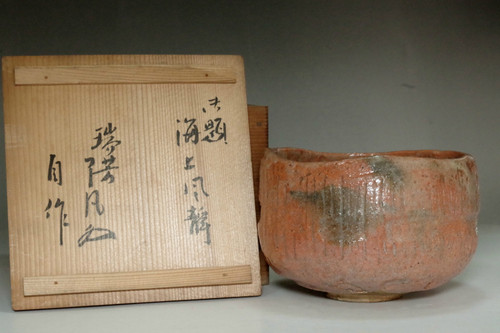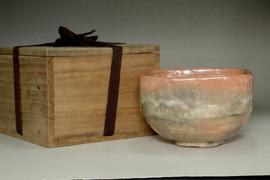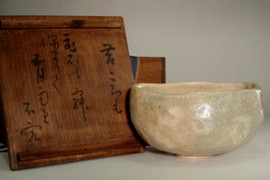1927’s "silent wind over the sea" vintage aka-raku tea bowl #3787
- SKU:
- 3787
- width: approx. 12cm (4 23⁄32in)
- height: approx. 8.5cm (3 11⁄32in)
- weight: 343g (gross 626g)
- condition: small damaged (see pictures)
- writing on the box: "Chokudai (theme of poem from imperial family) kai(sea)-jo(over)-sei(silent)-fu(wind)" tea bowl mady by Zuiho
"silent wind over the sea" is a Chokudai from 1927. Chokudai is a title for poetry and other poems submitted by the emperor. In particular, the title of the first poetry contest hold every year since 1869. However, it was cancelled in 1927 due to the death of Emperor Taisho. The title at that time was "silent wind over the sea".
aku ware
Raku ware is a type of pottery that is traditionally and primarily used in the Japanese tea ceremony, most often in the form of tea bowls called Raku chawan. In the Momoyama era (1568-1603), the first raku chawan was made by famous artist Raku Chojiro, the founder of Raku ware, after receiving orders from Sen no Rikyu, Japan's most famous Tea Ceremony artist. Rikyu also served ruler Toyotomi Hideyoshi. In the late Momoyama era, Rikyu ordered Raku Chojiro to make kuro raku chawan. Kuro means black in Japanese. Hideyoshi disliked black, and Rikyu ordered the black bowls knowing this. It is also said that Rikyu did this because Hideyoshi was considering invading Korea at that time. Sen no rikyu was against Hideyoshi actually. Unfortunately Hideyoshi ordered Rikyu to commit ritual suicide (seppuku) for another reason. After he died, his philosophy, "wabi" lived on with the black Raku bowls. Raku ware became one of the famous Tea Ceremony bowl styles to the present day. Wabi means accepting imperfection. This is a beautiful Japanese philosophy.
Raku ware is a type of pottery that is usually made without a wheel, formed only with the hands and a spatula according to a method called "hand kneading," then fired at 750℃- 1,100℃ and softly glazed.
In reflection of the aesthetics of Sen no Rikyu and his contemporaries, its characteristics include slight distortions from hand-kneading and a thick form. They are used as tea ceremony tools, such as chawan (tea bowls), hanaire (vases), and mizusahi (lidded water pots).
Kuro-raku
Kuro means black. Initially, a bisque is made, then painted with an iron glaze made from black stones from the Kamogawa River, dried, then, after repeating the glazing process a dozen times, it is fired at 1,000℃. While the glaze melts during firing, the piece is pulled rapidly from the kiln at the moment decided by the artisan, blackening it. This technique was common among the Mino.
It began with Chojiro, firing the first Kuro-raku chawan around 1581- 1586.
Aka-raku
Aka means red. Red clay is fired into a bisque, then a transparent glaze is applied and the piece is fired at 800℃. Aka-raku is famous for Honami Koetsu, a man deeply involved with the Raku family, and the pieces that introduced the way of Raku. In Rikyu's episode, it is said that Hideyoshi disliked Kuro-raku, preferring Aka-raku.




















